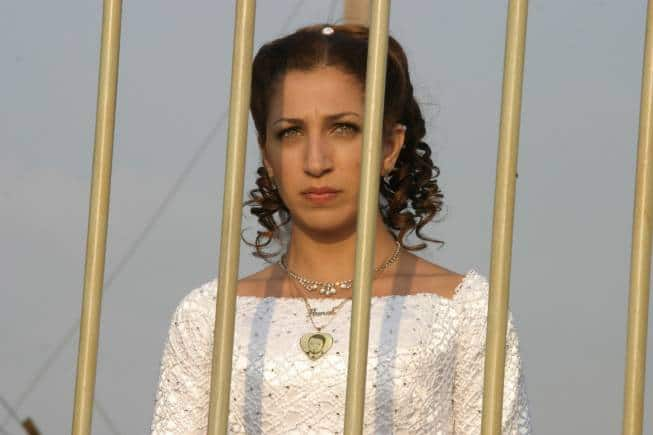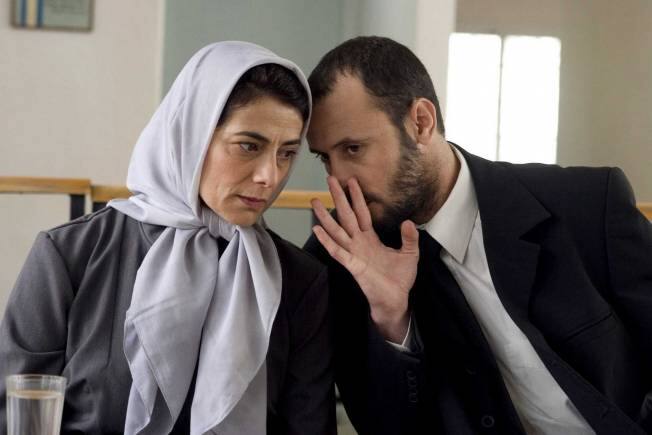



"All my cast are Iranians," says Eran Riklis, the Israeli director of such acclaimed movies as The Syrian Bride and Lemon Tree, about his new film based on the bestselling book, Reading Lolita in Tehran.
 Eran Riklis directed the 2004 film, The Syrian Bride, about a woman crossing a border post for her wedding with three Palestinian actors in lead roles (Photo: Courtesy of Eitan Riklis)
Eran Riklis directed the 2004 film, The Syrian Bride, about a woman crossing a border post for her wedding with three Palestinian actors in lead roles (Photo: Courtesy of Eitan Riklis)Iranian-born actors Golshifteh Farahani, Zar Amir-Ebrahimi, Mina Kavani and Abbas Fasaei play lead roles in Reading Lolita in Tehran, an adaptation of Iranian-American women's rights activist and author Azar Nafisi's powerful memoir.
Farahani, the Body of Lies and Extraction actor known in India for her role as a Rajasthani tribal woman alongside Irrfan Khan in Anup Singh's The Song of Scorpions, Amir-Ebrahimi, who won the Best Actress award at the Cannes film festival last year for playing a fearless journalist investigating serial killings of sex workers in the Iranian city of Mashhad in Holy Spider, and Kanavi, the lead actor in Jafar Panahi's No Bears, are all based outside Iran.
"I said to myself, I am going to do this movie only with Iranians. I am not going to bring actors who look Iranian, but are not," says Riklis, who lives in Tel Aviv, about the making of Reading Lolita in Tehran. "It is an amazing cast of Iranian women who are exiles."
Riklis, whose previous films dealing with human conflicts beyond borders, have all had actors from countries neighbouring Israel, including Palestinian actors. He cast three Palestinian actors — Hiam Abbass, Makram Khoury and Clara Khoury — in his 2004 film, The Syrian Bride, about a woman crossing a border post for her wedding. Hiam Abbass returned as the lead actor in his next film, Lemon Tree, a major highlight of the Cinefan Festival for Asian and Arab Cinema in Delhi in 2008, that told the story of a Palestinian farmer suing the Israeli Defence Minister for razing her lemon grove.
 Lemon Tree, directed by Eran Riklis in 2008, told the story of a Palestinian farmer suing the Israeli Defence Minister for razing her lemon grove (Photo: Courtesy of Eitan Riklis)
Lemon Tree, directed by Eran Riklis in 2008, told the story of a Palestinian farmer suing the Israeli Defence Minister for razing her lemon grove (Photo: Courtesy of Eitan Riklis)"I know it is going to be controversial," says Riklis, who was at the Cinefan festival in Delhi to present Lemon Tree. "Why is this Israeli director dealing with Iranian issues? I don't see it that way," he adds. "That is how I make films about Palestinians, about Israelis. I make films about people while respecting who they are and where they come from."
Published in 2003, Nafisi's Reading Lolita in Tehran: A Memoir in Books, revisits the Tehran-born writer's life in the Iranian capital as a professor of English literature at the University of Tehran in the years following the 1979 revolution that overthrew the Shah of Iran before being expelled from the campus for not wearing the veil.
The book, which details Nafisi's weekly meetings with her female students at her home to read Western novels like Lolita, Pride and Prejudice and The Great Gatsby, was published after she moved to the United States in 1997. The film is now in the final stages of post-production.
It was not easy finding finances for the movie Riklis had been preparing to make for many years. "Even though it is based on a bestselling book, it was not easy to find a producer. After many years of trying to raise finances, I finally found a producer in Italy, and also in Israel, who were ready to back the project," says Riklis, who was influenced by Indian directors like Satyajit Ray, and Japanese, Chinese and Russian filmmakers as a young student of cinema in London.
"It is an important film for me. The book is about Iran in '80s and '90s and it is always relevant. It will be even more significant because of what is happening now," says the director, who fought in the 1973 Yom Kippur war between Israel and Arabs as a 19-year-old, pointing to the protests in Iran following the death of Mahsa Amini, arrested for not wearing a headscarf.
"It is about freedom of thought. It is about women trying to break out of circles of oppression and the power of literature and free thinking. In a country like Iran in the '80s and '90s it was a very confusing time because of the revolution. Some people thought the revolution was better than the Shah. Then the Islamic elements started coming in very strongly and violently," he says. "It is a complex story."
The film, which revolves around Nafisi's life in Tehran and her works at the University of Tehran, was shot in Italy. "I brought actors from everywhere, from Paris, Los Angeles, New York, London, Berlin, Oslo, one also from India. Eventually the Indian actor could not make it," says Riklis, who was among the protesters marching against the Israeli government's judicial reforms last year.
Initially, production designers laughed at Riklis' plan to shoot the movie in Rome. "I met four production designers to discuss how to do Tehran in Rome," says the filmmaker. "And two of them said it was ridiculous and I was crazy."
"It was a big challenge," he says, recalling an anecdote during pre-production. "I went to the University of Rome and though I had never been to the University of Tehran, I had seen only pictures, I felt in my bones, this is correct."
"I called my Iranian expert from Tehran and asked him to come to Rome. The night before he was going to arrive, I was afraid. I thought he was going to hate it. He came, saw the University of Rome and started crying. He said, 'I feel I am back in the University of Tehran.' It is a university built by Mussolini. It is totally crazy."
Discover the latest Business News, Sensex, and Nifty updates. Obtain Personal Finance insights, tax queries, and expert opinions on Moneycontrol or download the Moneycontrol App to stay updated!
Find the best of Al News in one place, specially curated for you every weekend.
Stay on top of the latest tech trends and biggest startup news.